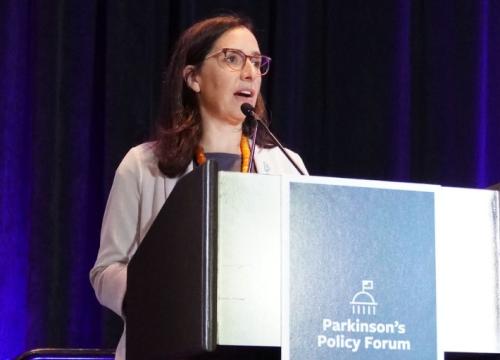Pregnancy and Fertility with Parkinson’s

It is estimated that about 400 women under the age of 50 are diagnosed with Parkinson’s disease (PD) in the U.S each year. It is unknown how many become pregnant, however, understanding how Parkinson’s may affect women before, during, and after birth can help expectant mothers, and their doctors, prepare them for this new and exciting time.
Mara Seier, MD, Assistant Professor in the Department of Neurological Sciences at the Nebraska Medicine Movement Disorders Center, answers our questions about navigating fertility and pregnancy while living with Parkinson’s.
Does Parkinson’s disease affect someone’s ability to get pregnant?
There have been no reported issues with fertility, conception or with the birthing process in women with PD. In fact, one recent review article concluded that in women with PD there was a lower rate of cesarean section compared to the average American woman. This review also concluded a lower rate of miscarriage compared to the average rate.
How does pregnancy affect Parkinson’s movement (or motor) symptoms?
The literature on how pregnancy affects motor symptoms of PD is conflicted on this topic. Several reports have indicated worsening of PD symptoms during pregnancy and in the postpartum period, but others have reported no change or even improvement during pregnancy.
A recent review of the literature showed that 52% of the women experienced improvement or no worsening in PD motor symptoms, with the vast majority experiencing no change in symptoms. It was also noted that women taking anti-parkinsonian medications were much more likely to have improvement or no change in PD symptoms.
Can pregnancy also affect non-movement (or non-motor) symptoms?
Little is known about how pregnancy affects non-motor symptoms in PD. We do know that pregnancy can cause many symptoms that are also common non-motor symptoms in PD such as constipation, dizziness, urinary frequency, fatigue, disrupted sleep or insomnia, mood changes and muscle cramping. Restless leg syndrome is also common in pregnancy and is much more frequent in those with PD as well.
Is it safe for pregnant women to take Parkinson’s medications?
Treatment with medications is often recommended. About half of women with PD who become pregnant will have worsening of their symptoms, and this risk is much higher in those who do not take any anti-parkinsonian medications. The issue is that there are no standardized or placebo-controlled studies to prove safety of anti-parkinsonian medication during pregnancy.
The PD medication with the most data is levodopa. It was reported that there was no increased rate of miscarriage, birth complications or birth defects seen with the use of levodopa. There is also some evidence that the use of dopamine agonists are possibly safe to use, but data is limited. There is stronger evidence to avoid use of amantadine during pregnancy given possible birth defects and increased risk of miscarriage with its use.
Are there other ways to help control PD symptoms while pregnant?
There are many benefits for exercise in PD, and this also extends to pregnancy. If medications are not being used for symptom control during pregnancy, then at the very least physical therapy and occupational therapy should be utilized. A recommended exercise regimen would be used in conjunction with input from an OB/GYN.
Can women living with Parkinson’s breastfeed?
Women living with PD can breastfeed their children, but there is a lack of data on breastfeeding in the setting of anti-parkinsonian medications and thus it is largely not recommended. Levodopa and dopamine agonists may suppress lactation, but despite this, some women have successfully breastfed while on these medications. Levodopa, amantadine, entacapone and tolcapone are excreted in breast milk and the potential effects on the infant are largely unknown.
Do you have tips on how to approach discussing PD with an OB/GYN?
Keep the lines of communication open between your neurologist and OB/GYN. Since becoming pregnant while living with Parkinson’s is relatively rare, I would personally go out of my way to have at least a telephone conversation with my patient’s OB/GYN to ensure that we are on the same page regarding medication management and expectations during the pregnancy.
Since a pregnant woman sees their OB/GYN frequently, the doctor may have more insight into how symptoms are changing and should not hesitate to reach out to the patient’s neurologist. I think too many times in medicine, we are relying on the patient to be the line of communication between specialists, yet the onus of this communication should be on the physicians.
What advice would you give to new mothers about managing their PD symptoms while taking care of a baby?
As a mother of two, and currently pregnant with my third, I can speak to what it is like to be a new mother. The emotional and physical effort it takes to take care for an infant is hard enough on its own, but when you add managing PD into the mix, this can be a very daunting task.
I would advise new mothers to:
- Have a support system and to not be shy about reaching out for help, as the effects of altered sleeping and eating times, dehydration (especially if breastfeeding) and physical recovery from birth can amplify PD symptoms.
- Seek out advice from your neurologist to come up with a plan if PD symptoms are worsening. Altered sleeping and eating times may also affect timing of anti-parkinsonian medications.
- Give yourself grace — don’t be too hard on yourself during this wonderful but exhausting time.
Why is there so little research on Parkinson’s disease and pregnancy?
PD is less prevalent in people of child-bearing potential, as it occurs with a 1.5-2:1 ratio in men compared to women. Additionally, PD presents before the age of 40 only about 5% of the time. Thus, the incidence of pregnancy alongside Parkinson’s is relatively unknown, with only around 90 cases of PD and pregnancy in the literature.
Furthermore, pregnant women are largely excluded from medication and treatment trials due to fear of effects on the fetus.
“Even though PD is less common in women, especially of childbearing age, it certainly does occur. Women in this group are an underrepresented population.” - Mara Seier, MD
Another complicating factor is that when most people (including neurologists) envision someone with PD, they often picture an elderly, white male. This “blind spot” can lead to delayed or misdiagnosis as well as reduced inclusion in research and reduced utilization of advanced treatments for women with PD. Even though PD is less common in women, especially of childbearing age, it certainly does occur. Women in this group are an underrepresented population.
How can more research on pregnancy and PD help improve life for women with PD?
Having more data and knowledge about pregnancy and PD may improve quality of life for people with PD who are of childbearing age, as we would be better able to guide them if they are considering pregnancy or become unexpectedly pregnant.
Currently, there are a lot of unknowns when it comes to issues pertaining to PD and pregnancy. At the very least, it would be helpful to have more robust data on what medications we can treat women with during pregnancy and during breastfeeding to keep their symptoms well controlled without harming their child.
Women experience Parkinson’s disease differently than men. Learn more about how PD affects women.
References:
1. Rubin SM. Parkinson’s Disease in Women. Disease-a-Month. 2007;53(4):206-213. doi:10.1016/j.disamonth.2007.02.002
2. Subramanian I, Mathur S, Oosterbaan A, Flanagan R, Keener AM, Moro E. Unmet Needs of Women Living with Parkinson’s Disease: Gaps and Controversies. Mov Disord. 2022;37(3):444-455. doi:10.1002/mds.28921
3. Seier M, Hiller A. Parkinson’s disease and pregnancy: An undated review. Parkinsonism Relat Disord. 2017;(40):11-17. http://dx.doi.org/10.1016/j.parkreldis.2017.05.007.
4. García-Ramos R, Santos-García D, Alonso-Cánovas A, et al. Management of Parkinson’s disease and other movement disorders in women of childbearing age: Part 1. Neurol (English Ed. 2021;36(2):149-157. doi:10.1016/j.nrleng.2020.05.015
5. Kranick SM, Mowry EM, Colcher A, Horn S, Golbe LI. Movement disorders and pregnancy: A review of the literature. Mov Disord. 2010;25(6):665-671. doi:10.1002/mds.23071
Related Blog Posts

Shaping the Future of Parkinson’s Policy: Meet Our Chief Strategy and Policy Officer

Neuro Talk: Newly Diagnosed
